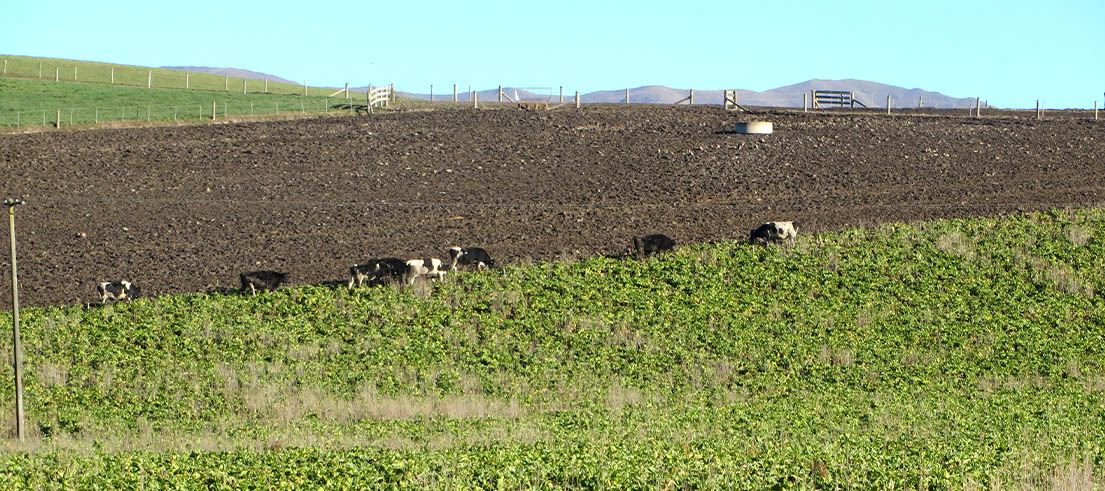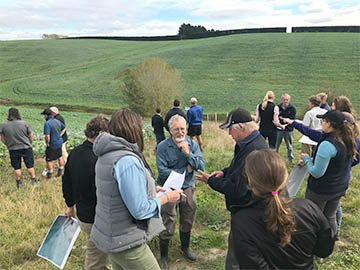
Early help encouraged for winter grazing issues
Environment Canterbury is encouraging farmers to follow good winter grazing management practices and, if needed, seek advice as early as possible this winter.
Recent severe weather, including drought and then flooding, means Canterbury farmers are facing a challenging winter and we are working with industry bodies to offer advice and support.
General Manager - Field Operations, Nick Daniels, said winter grazing can be a significant environmental and animal welfare issue if not well managed, so having a good plan is important.
"This year, with the recent weather events, it will be even more important for farmers to have an updated winter grazing plan in place to inform early on-farm decisions. Support is available from industry groups and Environment Canterbury to help make this happen.”
Industry support available
Daniels said farming sector groups were well aware of the issues for this winter and have already provided support to farmers on best practice winter grazing with guidance, discussion groups, and a joint advertising campaign with regional councils.

Farmers asking questions about winter grazing at a field day in South Canterbury
"It’s great to see the considerable industry-based support available to assist farmers, and we strongly encourage any farmers struggling with winter grazing to seek advice sooner rather than later.”
Environment Canterbury has implemented some of the strictest land-use rules in New Zealand requiring farmers to manage a range of environmental issues, including those caused by winter grazing.
The inclusion of winter forage crop grazing in the Government’s Essential Freshwater rules, which will mostly come into force for next winter, highlights the significance of this issue nationally.
"Farmers, the industry and Environment Canterbury are all committed to good environmental outcomes,” said Daniels.
“Should compliance issues arise, our team will consider the individual circumstances of the farmer, including the extent of planning and actions that have been undertaken. This could also include situations where flood damage has resulted in grazing plans having to be altered, or stock moved to other locations.”
Rules on winter grazing
Poorly managed winter grazing can result in elevated nitrate leaching, sediment run-off, phosphorus contamination, increased bacterial levels in water and animal welfare issues.
Good Management Practice
Our rules require Good Management Practice on winter grazing to be implemented on all farms, including having vegetative buffers between any winter grazing and waterways – usually a minimum of five metres. Buffers around critical source areas, as well as paddock selection, strategic grazing, and post-grazing paddock management all need to be carefully considered and planned.
“Early planning is essential, ideally when forage crops are being planned, and mitigation measures will vary farm to farm and from season to season,” said Daniels.
Limits are also in place around discharges of sediment and contaminants to waterways, as well as strict restrictions on stock access to rivers, lakes, wetlands and drains, and consent to farm requirements regulating winter grazing.
Farm Environment Plans
Farms that require a land use consent to farm need to prepare and implement a Farm Environment Plan (FEP), which is regularly audited, to manage environmental risks including those associated with intensive winter grazing.
As part of their FEP, farmers need to plan how they are carrying out winter grazing to ensure they can meet requirements throughout the season. Our guidelines for FEP farm auditors on winter grazing management, released last year, is a good resource to help with the planning process.
National rules on intensive winter grazing
The new national regulations around intensive winter grazing (NESF) do not generally apply until July 2022, except for those wishing to expand or introduce new intensive winter grazing on their properties.
Additionally, the Government’s ‘Intensive Winter Grazing Farm Plan Module’ is not a regulatory requirement for this year, however the guidance within it around Good Management Practice, should be followed and can be used as a template to document winter grazing plan.
Where to get support for winter grazing
- Visit ecan.govt.nz/winter-grazing, or get in touch with Customer Services on 0800 324 636 and ask to talk to one of our land management advisors.
- Industry groups including DairyNZ / Beef+Lamb NZ / Deer Industry New Zealand / FAR
- MPI: Farms which have lost crops or grazing area as a direct result of the weather, can consider contacting MPI Feed Coordination Service, who can assist with finding farmers with feed or grazing for sale on 0800 00 83 33.
Find out more
- Access more information and resources on winter grazing.
- Find out the consent to farm rules applicable to your zone.
